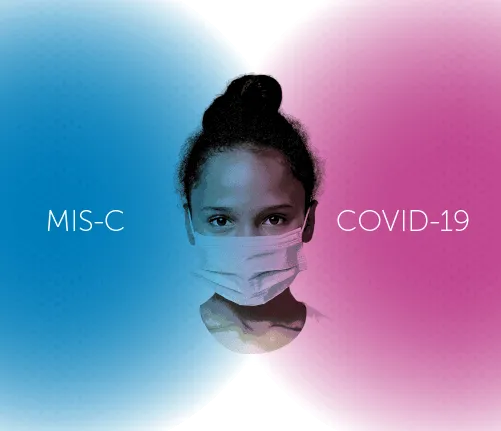Boston Children’s is actively researching COVID-19 and MIS-C.
Breadcrumb
- Home
- Conditions & Treatments
- MIS-C
What is multisystem inflammatory syndrome in children (MIS-C)?
Multisystem inflammatory syndrome in children (MIS-C), also called pediatric multi-system inflammatory syndrome temporally related to SARS CoV-2 (PMIS or PIMS-TS), is a potentially serious illness in children that appears to be a delayed, post-infectious complication of COVID-19 infection.
MIS-C has varied symptoms that affect several organs and systems in the body. Many children have symptoms resembling toxic shock syndrome or Kawasaki disease, in which the coronary arteries enlarge or form aneurysms. Also common are heart inflammation with impaired heart function and low blood pressure, rash or red eyes, and gastrointestinal symptoms. These symptoms can occur in different combinations.
If you think your child might have MIS-C, consult with your primary care provider or bring your child to the Emergency Department. Blood tests may be recommended, depending on your child’s symptoms. Children with MIS-C need close observation by pediatric specialists in rheumatology, cardiology, critical care, and sometimes hematologists and infectious disease doctors.
Is my child at high risk for MIS-C?
While Boston Children’s Hospital and other medical centers are still actively collecting data on MIS-C, it seems so far to be rare. Most children recover to an excellent state of health with careful observation and treatment. Children with MIS-C need to be hospitalized, but only a very small percentage have passed away.
Should children who have had MIS-C receive COVID-19 vaccination?
This question is actively being studied. While we wait for answers, we recommend talking with your medical providers to decide if and when to vaccinate your child, per recommendations of the U.S. Centers for Disease Control and Prevention (CDC). The latest guidance from the CDC can be found on its website.
Symptoms & Causes
What are the symptoms of MIS-C?
Symptoms of MIS-C may vary from child to child. The main symptoms to watch for are a persistent fever (lasting more than 24 hours and usually present for several days), your child appearing fatigued and ill, rash, red eyes, abdominal pain, vomiting, diarrhea, or loss of appetite or not drinking enough fluids. MIS-C symptoms can get worse quickly, so seek timely medical attention if you see anything concerning.
Specific features of MIS-C may include:
- Skin/mucous membrane signs and symptoms: Rash, bloodshot eyes, swollen or red hands and feet, inflamed mucous membranes in the mouth, cracked lips, and a swollen tongue that looks like a strawberry.
- Symptoms and signs of shock or heart problems, such as cold, clammy skin, very low blood pressure, difficulty breathing, severe shortness of breath with exertion, dizziness or light headedness, and a very high heart rate or irregular heartbeat.
- Gastrointestinal symptoms: Diarrhea, vomiting, or abdominal pain.
- Respiratory symptoms such as cough and shortness of breath.
- New neurologic symptoms, such as headache, neck pain, confusion, numbness/tingling in the hands and feet, or seizures.

What causes MIS-C in children?
The cause of MIS-C is not yet fully understood — it’s a question that’s being actively investigated, here at Boston Children’s and elsewhere.
Some researchers suspect that MIS-C is caused by a delayed immune response to the coronavirus that somehow goes into overdrive, causing inflammation that damages organs. It’s also possible that the antibodies children make to the virus, or some of their immune cells, are creating the illness. Since only a small number of children develop MIS-C, it is possible that there are genetic factors that make some children susceptible.
It is important to remember that overall, children fare very well with COVID-19 as compared to adults. Only a small number of children seem to develop signs and symptoms of MIS-C, and most have recovered quickly.
Diagnosis & Treatments
How is MIS-C diagnosed?
Currently, MIS-C is diagnosed based on symptoms (persistent fever and dysfunction of one or more organs, such as the heart or gastrointestinal system), together with laboratory tests to look for signs of inflammation in the body.
Children should also have a positive test for COVID-19. Testing is also done to rule out other possible causes of the symptoms, such as other infections.
Once MIS-C is diagnosed, children will need to be followed over time with laboratory tests to assess inflammation, blood clotting, liver function, heart function, and other aspects of their illness. Children should also have echocardiograms to evaluate their heart and coronary arteries, and some children with heart problems may also require additional testing such as cardiac MRI, Holter monitors, or exercise testing.
How is MIS-C treated?
Children diagnosed with MIS-C need close observation. All need to be admitted to the hospital, and some may need intensive care. Pediatric specialists in rheumatology, critical care, and cardiology can anticipate and address different aspects of the illness.
Treatments include IV immunoglobulin (used to treat Kawasaki disease), and anti-inflammatory drugs (corticosteroids, and drugs blocking IL-1 or IL-6). Other treatments may be used depending on the results of laboratory tests. Children are also treated with low-dose aspirin to decrease the risk of blood clots.
Children need to be followed after discharge from the hospital, with repeat echocardiograms to monitor their heart and coronary arteries, even if they didn’t have serious problems in the hospital. Children who are fully recovered at six months no longer need close follow-up.


